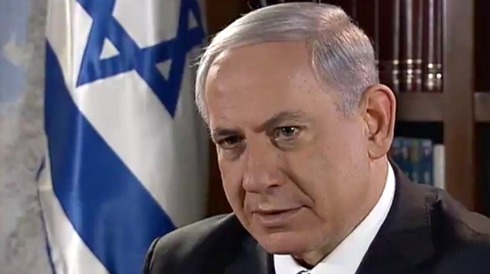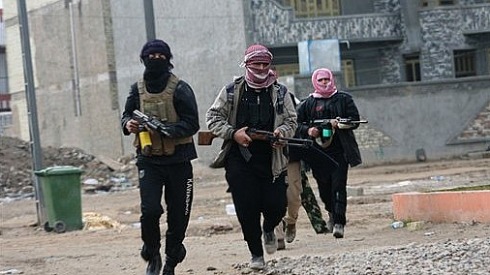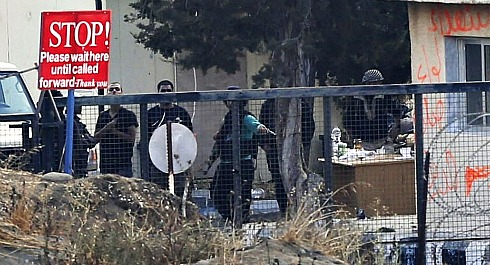Archives
AND MORE...

Justice, The Hamas Way
_____________________

Terror Tunnels
_____________________

Make-Believe Foreign Policy
_____________________

The Mess He Hath Wrought
_____________________
August 30, 2014
Fallujah In Gaza?
Should Israel have agreed to the ceasefire with Hamas or should it have used the Gaza war to eradicate Hamas?
MANY Israelis are disappointed that PM Netanyahu did not choose the latter, but Netanyahu makes a good case for the former (see below).
You decide, although one thing is clear: Being Prime Minister of Israel is one of the toughest, if not the toughest job in the world.
Times of Israel | August 30, 2014
Netanyahu: I didn't want an Israeli Fallujah in Gaza
PM defends decision not to send troops to oust Hamas; amid al-Nusra gains in Syria, says resources also needed to protect Israel on other fronts
By Itamar Sharon

Prime Minister Benjamin Netanyahu speaks to Channel 2 on August 30, 2014 (Photo credit: Channel 2 screen capture)
Prime Minister Benjamin Netanyahu on Saturday defended his decision-making throughout Operation Protective Edge in the Gaza Strip. Responding to a wave of public criticism and dissatisfaction with the results of the war against Hamas, he maintained that his government had acted responsibly, and said he didn’t want an Israeli “Fallujah” in Gaza.
Netanyahu told Channel 2 in a lengthy interview that he did not rule out reconquering Gaza and uprooting Hamas in the future — as many of his critics and detractors have demanded — if conditions necessitated such a move, but warned that such drastic action would come at a heavy price and would carry lasting consequences for Israel.
In order to drive home his point, Netanyahu referenced the US’s war in Iraq and specifically the many battles and heavy casualties it suffered in its attempt to cleanse the city of Fallujah of militant forces, an attempt which he said was quickly undone once the military left the territory.
“The US fought against a smaller Gaza called Fallujah… Fallujah is a tenth the size of Gaza. The great United States fought in Fallujah, its Gaza, sacrificed hundreds of soldiers who fought bravely… Went in once, twice, three times,” he said.
“Thousands of Iraqis were killed there. Many thousands. And in the end it went out and al-Qaeda came back.”

Gunmen patrol during clashes with Iraqi security forces in Fallujah, 40 miles (65 kilometers) west of Baghdad, Iraq, January 5, 2014 (photo credit: AP)
Netanyahu said he believed an attempt to conquer Gaza temporarily in order to oust Hamas would carry a similarly high cost in soldiers’ lives as well as in civilian casualties. “If we pay those prices, and they are heavy prices, we may need to stay there,” he said. But such a continued presence would waste precious resources at a time when Israel must also contend with threats on other fronts.
“We have al-Qaeda on the fence now in the Golan Heights,” he noted, referring to the al-Qaeda-linked al-Nusra Front which in recent days has taken over territory adjacent to the Israeli border, including Syria’s only border crossing with Israel. “The Islamic State is racing towards us and al-Qaeda is on the Golan borders… I chose in this reality not to invest all of our resources in this one arena (Gaza).”

Armed rebels seen at Syria's Quneitra border crossing to the Israeli-controlled Golan Heights, Friday, Aug. 29, 2014. (photo credit: AP Photo/Ariel Schalit)
“I believed that what we should do at this time is simply to pound them. So maybe they remain [in power] but they are pulverized; they are isolated; they cannot smuggle weaponry,” Netanyahu said. He noted that the objectives of the operation had never been to topple Hamas, only to hit it heavily enough to deter it and curtail its ability to attack Israel.
“We’ve done this,” he maintained. “We’ve dealt them a terrible, terrible blow… We’ve given Hamas a thrashing that it will remember for many years.”
“I think this creates a chance – not a certainty but a chance – for us to have lasting quiet,” he added.
Netanyahu spoke of zero tolerance for a “drizzle” of rocket attacks, vowing to hit hard in response to any further rocket-fire from Gaza. “Drizzles will be answered with a downpour” of Israeli fire, he said.
Netanyahu also downplayed his not-so-private clashes over the handling of the operation with certain government ministers, namely Economy Minister Naftali Bennett and Foreign Minister Avigdor Liberman, who have both made no secret of their contempt for his reluctance to topple Hamas.
“There was some creaking,” he admitted, but said that in the end, “up to this point the government has acted as it should.”
The prime minister claimed not to be too worried about criticism against him, saying he believed much of the public recognized that the campaign had been waged responsibly and with levelheadedness.
“In the face of all the criticisms, in the face of all the critics, in the face of all the background noise and private interests – I was unphased and I was very determined,” he said.
Opinion polls in recent days have shown a fall in support for Netanyahu, and Liberman has led criticism of the failure to topple Hamas. Liberman said Friday that Israel wasted a golden opportunity to eradicate Hamas.
Justice Minister Tzipi Livni, for her part, said Saturday that the government must either renew peace talks with the Palestinian Authority or brace for a diplomatic backlash from the international community.
Speaking about the now seemingly abandoned peace process with the Palestinian Authority, Netanyahu said the recent conflict in Gaza had brought home to many Israelis how dangerous Palestinian sovereignty in the West Bank could be if Israel’s safety was not guaranteed.
“My insistence on the security issue is now better understood, I think. The problem of demilitarization which I believe is not only true for Gaza but for [the West Bank] as well: Who will prevent tunnels from being dug? Who will prevent rockets from being manufactured? Who will demilitarize the territory?” he asked. “You can’t talk about a diplomatic process without talking about security.”
Palestinian Authority President Mahmoud Abbas, he said, would have to choose between Hamas and Israel.
“The choice I spoke of months ago has proven itself not be true but super-true. It’s either Hamas or peace…Hamas doesn’t just threaten us, it was about to overthrow him, to carry out a coup,” he said, referring to Israel’s recent reveal of a Hamas network in the West Bank which allegedly sought to topple the PA.
The premier elaborated, if only slightly, on his recent cryptic comments on new “diplomatic horizons” which had opened up to the Jewish state saying “There is a not-insignificant number of nations which sees the threats around us as threats to them [as well]. As a result they are treating Israel not as an enemy but as a potential partner.
“Whether this partnership in the face of dangers will also lead to partnership on opportunities is something we will have to look into soberly and responsibly,” he said.
“I’ve never had any illusions about the Middle East,” he added wryly. “When the Arab Spring, the so-called Arab Spring erupted, I said there wouldn’t be any great liberal [forces] coming forward, that there would rise Islamic movements” he said, in likely reference to the Islamic State and other extremist groups that have arisen in recent years out of the conflict in Syria and other nations.
But in the joint need to fight these groups, he said, “there may be a basis for new partnerships, and these partnerships can create opportunities – both security-related and diplomacy-related.”
Original article here.
Log In »
Notable Quotables
"Mr. Netanyahu is one of the most media-savvy politicians on the planet. On Friday he appeared live via video link on 'Real Time with Bill Maher,' taking the host’s alternately sardonic and serious line of questioning with gazelle-like alacrity."
~ Anthony Grant, jourrnalist who has written for many major newspapers and worked in television at Paris and Tel Aviv, interviewing former PM Benjamin Netanyahu on Monday, at the outset of Mr. Netanyahu's new book (more here).


